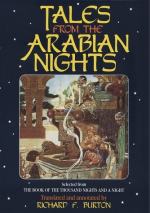[FN#211] An Egyptian or a Syrian housewife will make twenty dishes out of roast lamb, wholly unlike the “good plain cook” of Great or Greater Britain, who leaves the stomach to do all the work of digestion in which she ought to but does not assist.
[FN#212] A plate of “Baysar” or “Faysar,” a dish peculiar to Egypt; beans seasoned with milk and honey and generally eaten with meat. See Mr. Guy Lestrange’s “Al-Mukaddasi,” Description of Syria, p. 80; an author who wrote cir. A.H. 986. Scott (vi. 119) has “A savoury dish called byssarut, which is composed of parched beans and pounded salt meat, mixed up with various seeds, onions and garlic.” Gauttier (vi. 261) carefully avoids giving the Arabic name, which occurs in a subsequent tale (Nights cdxliv.) when a laxative is required.
[FN#213] Arab. “Mulukhiyah nashiyah,” lit. = flowing; i.e. soft like epinards au jus. Mulukhiya that favourite vegetable, the malva esculenta is derived from the Gr. {Greek} (also written {Greek}) from {Greek} = to soften, because somewhat relaxing. In ancient Athens it was the food of the poorer classes and in Egypt it is eaten by all, taking the place of our spinach and sorrel.
[FN#214] Arab. “Kalak” = lit. “agitation,” “disquietude” and here used as syn. with “Kulanj,” a true colic.
[FN#215] Arab. “Mazarat,” from “Mazr,” = being addled (an egg).
[FN#216] Here is an allusion to the “Massage,” which in these days has assumed throughout Europe all the pretensions of scientific medical treatment. The word has been needlessly derived from the Arab. “Mas’h” = rubbing, kneading; but we have the Gr. synonym æ and the Lat. Massare. The text describes child-bed customs amongst Moslem women, and the delivery of the Kazi has all the realism of M. Zola’s accouchement in La Joie de Vivre.
[FN#217] Arab. “Fa’alah” = the building craft, builders’ trade.
[FN#218] In text “Kawwarah,” which is not found in the dictionaries. “Kuwaray"= that which is cut off from the side of a thing, etc. My translation is wholly tentative: perhaps Kawwara may be a copyist’s error for “Kazazah” = vulg. a (flask of) glass.
[FN#219] The “Khaznah,” = treasury, is a thousand “Kis” = 500 piastres, or 5 at par; and thus represents 5,000, a large sum for Tripoli in those days.
[FN#220] The same incident occurs in that pathetic tale with an ill name = “How Abu al-Hasan brake Wind.” vol. v. 135.
[FN#221] Arab. “Karkabah,” clerical error (?) for “Karkarah” = driving (as wind the clouds); rumbling of wind in bowels. Dr. Steingass holds that it is formed by addition of a second “K,” from the root “Karb,” one of whose meanings is: “to inflate the stomach.”
[FN#222] For Ummu ’Amrin = mother of ’Amru, so written and pronounced " ’Amr,” a fancy name, see vol. v. 118, for the Tale of the Schoolmaster, a well-known “Joe Miller.” [Ummu ’Amrin, like Ummu ’Amirin, is a slang term for “hyena.” Hence, if Ass and Umm Amr went off together, it is more than likely that neither came back.—St.]




